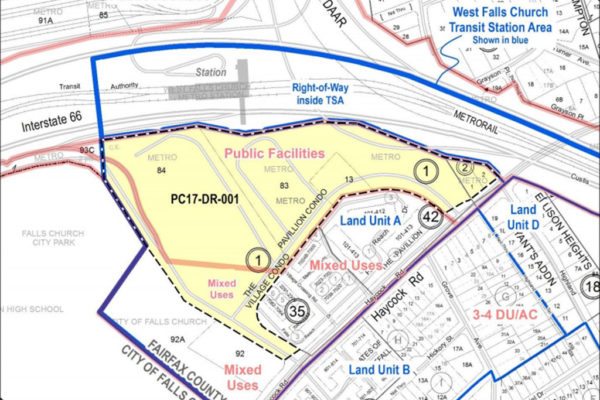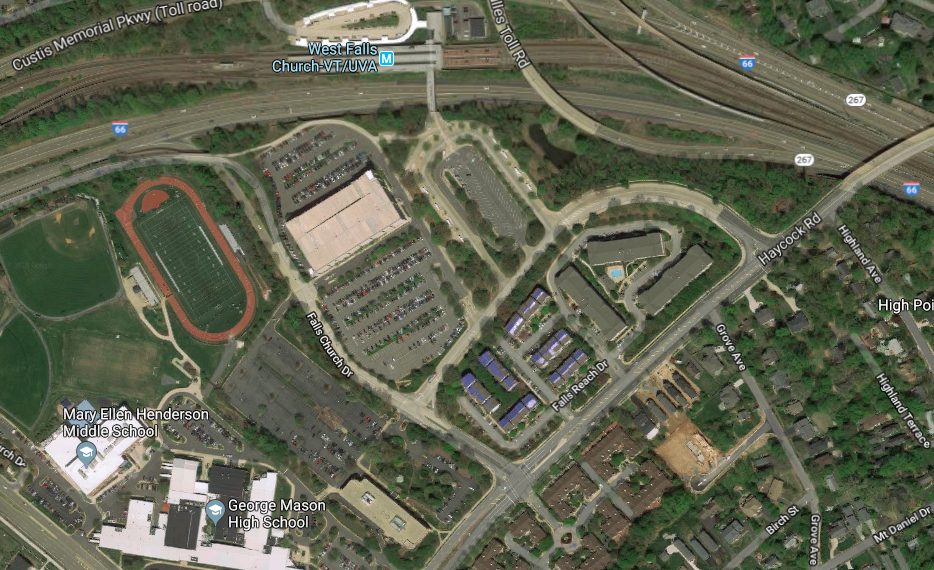When Virginia Tech canceled plans to expand the West Falls Church campus on February 28, the effects were felt in three different jurisdictions.
The planned project to build a design school and a new main building for the Falls Church construction company HITT Contracting in the Northern Virginia Center had been in progress since 2019. It was to be part of a major redevelopment of the area around the West Falls Church tube station.
Officials from Fairfax County, the City of Falls Church, and the Washington Metropolitan Area Transit Authority, all of whom are overseeing the land around the station, say the collapse of the Virginia Tech and HITT project did not materially change their ambitions for the area, but in full consequences are not yet clear.
The Fairfax County’s West Falls Church Transit Station Area Task Force has rescheduled a meeting scheduled for tonight (Tuesday) to April 6 to give county staff more time to review the implications of Virginia Tech’s decision and rate HITT.
“Virginia Tech’s decision does not change the overall vision of the county for the West Falls Church transit station area,” the county said in a statement to Tyson’s reporter. “The county is currently reviewing the next steps for the current plan change, which is currently under consideration, as Virginia Tech recently announced.”
Dranesville District Supervisor John Foust convened the task force in 2019 to make recommendations for updating the comprehensive Fairfax County plan for the West Falls Church TSA in light of new development proposals from Virginia Tech and Metro.
While its work was interrupted by the COVID-19 pandemic last spring, the task force has met 20 times over the past two years to review the proposed changes related to “adding residential and non-residential uses to the TSA, improved connections and additional parks and open spaces, ”said Fairfax County.

A draft of a major change was released on December 9, and a public hearing before the Fairfax County’s Board of Directors is expected to take place later this spring, although a specific date has not been set.
“The main goals for development in the West Falls Church transit station area are to encourage rail use, maintain stable neighborhoods and build an established sense of community,” said Fairfax County. “… The County looks forward to working with Virginia Tech in the future to achieve its transit station goals.”
WMATA spokeswoman Sherri Ly told Tyson’s reporter last week that her plans to conduct mixed-use development on 24 acres adjacent to West Falls Church underground station have not changed.
The proposal involves replacing and reconfiguring the existing train station parking lot, adding 500 to 700 new residential units, 150,000 square feet of office and 50,000 square feet of retail space.
Hoping to coordinate with neighboring property owners, Metro hired EYA LLC, Hoffman and Associates, and Rushmark Properties LLC to do the project. EYA and Hoffman are working on the Falls Church City gateway project, while Rushmark was involved in the planned Virginia Tech expansion.
Ly confirmed that the development team has not changed but did not provide any further details on the current status of the Metro project.
Susan Finarelli, director of communications for the City of Falls Church, says there’s not much to say about Virginia Tech’s cancellation in terms of its impact on the city. The gateway project has been overhauled, but these were triggered by the economic impact of the pandemic.
However, she confirmed that the city will be working with Virginia Tech on a smart city technology initiative that will equip the proposed mixed-use development with data acquisition sensors and a new road connecting Route 7 to Northern Virginia Center on Haycock Road. as reported by the Washington Business Journal on March 8th.
“The city is excited to partner with Virginia Tech for the Smart City Technology Program, which will provide Falls Church with state-of-the-art transportation solutions, including support for autonomous vehicles, adaptive lighting and parking lot usage indicators,” said David Tarter, Mayor of Falls Church. “These solutions will reduce pollution and traffic congestion and improve public safety.”
Images via Google Maps, Fairfax County
